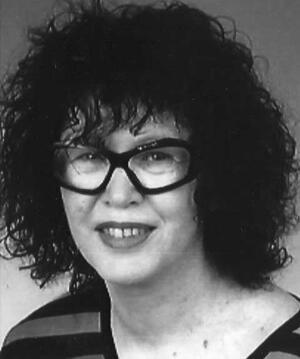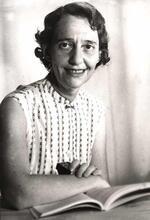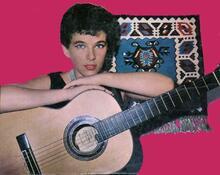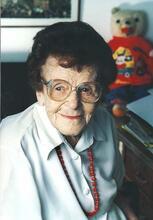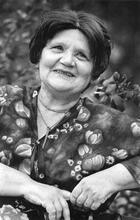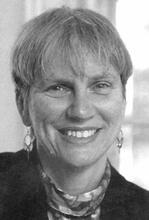Dalia Ravikovitch
Israeli poet Dahlia Ravikovitch, born in 1936, was one of the most significant figures in modern Hebrew literature and poetry and is best known for her ground-breaking feminist poetry and political involvement. After studying literature at Hebrew University of Jerusalem, she lived most of her life in Tel Aviv and published some twenty volumes of work, including ten poetry books, eight books for children, three collections of short stories, and multiple translations of others’ work from English into Hebrew. Her success in the male-dominated field of Hebrew poetry made Hebrew poetry written by women much more common in Israeli culture. Among her many awards are the Bialik Prize, the Shlonsky Prize, the Prime Minister’s Award, and the prestigious Israel Prize, which she won in 1998.
“Dalia Ravikovitch has her own lyrical voice,” the esteemed literary scholar Baruch Kurtzweil wrote in the daily Ha’aretz in 1959, upon the publication of the poet’s first book, The Love of an Orange (the Hebrew term for orange is, literally, “golden apple”). “She does not have to imitate contemporary modernist trends, as other poets do,” he added, “because her poems are inherently unique. Even the defiant exoticism in her poems does not come from anywhere but her inner world, from a unique reality that is transformed into genuine poetry capturing one’s heart with its profound musicality. ...” Kurzweil became her mentor and a kind of father-figure for her, since he had been her teacher at Hugim high school in Haifa.
Ever since Kurtzweil’s spirited acknowledgement of her work when the poet was only 23 years old, Ravikovitch has been considered a “wonderful gift to Hebrew culture” by both the most conservative and the most progressive forces in Hebrew literature. Among her many awards are the Bialik Prize, the Brenner Prize, the Shlonsky Prize, the Prime Minister’s Award and the prestigious Israel Prize, which she won in 1998.
Early Life & Family
Ravikovitch was born on November 18, 1936, in Ramat Gan, a Tel Aviv suburb. Her father, Levy (b. Berlin, 1909, d. Ramat Gan 1942), an engineer, came to Palestine in the early 1930s via China. Her mother Michal (née Houminer), a teacher by profession, was born in 1908 in Rehovot and died in 1996. There were also twin sons, Ahikam and Amiram, born in 1942. In that year, when Ravikovitch was six years old, her father was run over and killed by a drunken driver, leaving his daughter with a permanent sense of loss and orphanhood.
After Levy’s death, Ravikovitch’s mother moved to A voluntary collective community, mainly agricultural, in which there is no private wealth and which is responsible for all the needs of its members and their families.Kibbutz Geva with her family and later married a kibbutz member, Israel Gur-Arieh. Dahlia, however, feeling herself a misfit, left the kibbutz at the age of thirteen and moved in with a series of foster families in Haifa. She studied literature at the Hebrew University of Jerusalem and later worked as a high school teacher and theater and television critic.
Ravikovitch lived most of her life in Tel Aviv. She was twice married and divorced. Her first, very brief, marriage at the age of twenty, was to the writer Yosef Bar-Yosef. Her second was to the media personality and writer Yitzhak Livni, who remained her close friend, telephoning her every day. Her third long-term relationship, which lasted for thirteen years, was with attorney Hayyim Kalir, with whom she had a son, Ido Kalir, in 1978.
Ground-breaking Feminist Poetry
Ravikovitch published some twenty volumes of works, including ten poetry books, eight books for children, and three collections of short stories. She translated into Hebrew poems by Yeats, T. S. Eliot, Poe, and others, as well as children’s classics such as Mary Poppins. For some time she earned a living through journalism, working among others for the daily Ma’ariv, but in the 1980s she resigned from her post there and lived in perpetual anxiety regarding her livelihood.
When Ravikovitch’s poems began to appear in the late 1950s, she was virtually the only recognized female Hebrew poet of her generation. She was an instant success in the male-dominated field of Hebrew poetry, even though her works were antithetical to those of her contemporaries and to the poetic ideals they had established for their time. They—innovative poets such as Natan Zach, David Avidan, and Yehuda Amichai—were predominantly preoccupied with the objective world. Rejecting the highly figurative language of their predecessors, they placed their values in clarity and exactness of detail, in the fluidity of everyday language, and in declining to implicate any abstract meanings in the poems’ effect. Ravikovitch’s early works, conversely, were lyrical and abstract. Many of them tended to be traditionally structured and rhymed and her language was highly adorned and essentially fanciful. In the context of literary history, the poetics of Ravikovitch’s contemporaries were largely Imagistic and effectively ascetic, while hers were Symbolist and hedonistic; their works were progressive, while hers were somewhat retrogressive.
Ravikovitch was celebrated as the preeminent successor of Lea Goldberg, the major female poet in Israel in the 1930s and 1940s (who read her early works and helped her publish them). Her recognition by the literary establishment was thus based on gendered presumptions, and her work was often measured against the separate and distinctive tradition of women’s Hebrew poetry. However, like Goldberg, Ravikovitch also played a significant role in the reception of the “Young Poetry” by the coterie of Hebrew Modernists (Avraham Shlonsky, Nathan Alterman, Goldberg herself, and other authors), as well as opposing Nathan Zach's critique of Alterman's poetry. The astonishing literary achievement and public success of Ravikovitch's first book of poems, The Love of an Orange (1959), compared only to Altermans' debut piece Stars Outside (1938), made Hebrew poetry written by women much more common in Israeli culture.
Ravikovitch’s early works appear prototypically female, yet also marked by an early feminist perception. Her lyrical poems present “a tiny woman” struggling to survive in an overwhelming universe or a “clockwork doll” that finds herself in a place where no one can understand her existence: “they cast me aside with the dogs and the cats” (all translations here are by Chana Bloch and Chana Kronfeld). Speaking in intensely emotional tones, the female speaker in Ravikovitch’s poems laments the loss of her tender childhood dreams as she acquiesces to the harshness of adult existence. Presumably speaking in her own voice, the poet yearns for the love of the father she hardly knew, all the while portraying him in the image of a distant, heartless, authoritarian figure. She also yearns for the love of a man, yet far from being a desired bliss, love for her is a brutal and destructive affair (“An orange did love/The man who ate it./A feast for the eyes/Is a fine repast;/ Its heart held fast/His greedy gaze.”) Rendering the experience of earthly love as an unfulfilling and self-annihilating matter that grows not out of emotions but simple bodily desires, Ravikovitch goes on to create for her loveless, dejected soul a gratifying existence in some imagined paradisiacal state away from its anguished realities: “There did I know a delight beyond all delight,” she writes, “And it came to pass upon the Sabbath day/As tree boughs reached for the sky with all their might./Round and round like a river streamed the light…”
Mature Works
Marked by fantasies and dreams, the wish to transcend in Ravikovitch’s poems frequently assumes imaginary visits to exotic lands such as China and Madagascar, Scandinavia, Australia and New Zealand. At first blush, these fabulous journeys serve to calm the speaker’s tormented mind. Yet the poet’s objectives are far-reaching as she seeks to shatter the social and cultural boundaries in which she feels entrapped, in the hope of finding in remote places models of a different life, free of authoritarian practices and stifling conventions. Always in a fluid state of transformation (“today I’m a hill/tomorrow a sea”), she is eager to create for herself spaces of freedom and independence, usually to no avail. Every attempt to break away results in a disappointing return to a stifling existence in a world governed by customs and laws she is unable to escape.
The highly stylized concentration on the self and its narcissistic desires, the benchmark of her early works, began to fade away in Ravikovitch’s third volume, The Third Book (1969). As one critic put it (in a reductive yet appealing way), her poetry turned from the Pleasure principle to Reality principle. Oftentimes showing an increasing affinity for her colleagues’ poetics of impassive detachment as well as for their informal language and loose structures, Ravikovitch began to represent contemporary life in Israel and the pain and vulnerabilities of others more directly. A political dissident since the early 1980s and an outspoken protestor against the 1982 Lebanon War and Israel’s treatment of the Palestinian population, in her later works Ravikovitch denounced the Israelis for ignoring the Other's suffering. Wondering “what's happening to us” and to the ideological dreams of Israel’s founding fathers, she adopted—and adapted—the voice of biblical prophets (following mostly Bialik's precedent) to protest against any violence and misuse of power.
Though her crisp lyricism remained essentially unchanged and could sometimes evoke the sense of emotional turmoil displayed in her earlier poetry, in the course of four decades Ravikovitch developed into a versatile writer who engaged in a wide range of issues: personal and general, local and international. She never abandoned typically female topics such as women’s entrapment in the kitchen or her experiences as a mother (and in doing so she showed the way to many Israeli poets, both men and women, to write about parenthood, until then a quite neglected theme in modern Hebrew poetry). And yet, in her later works Ravikovitch mostly traveled through real and imaginary worlds exploring the pain and suffering of men and women throughout the universe. She never seems to offer any real solutions to the atrophies of human lives. But in her subversive links to traditionally male Jewish texts, such as the Codification of basic Jewish Oral Law; edited and arranged by R. Judah ha-Nasi c. 200 C.E.Mishnah and the A type of non-halakhic literary activitiy of the Rabbis for interpreting non-legal material according to special principles of interpretation (hermeneutical rules).Midrash, and to universal myths, legends, and fairy tales, Ravikovitch was the first woman poet in Hebrew to confront a world dominated by ancient texts and by the power of their words, and to use it for her own purposes. Through her writings on victimization one hears the voices of those oppressed and depressed by tyranny and violence and begins to recognize the injustices that are built into our lives, our society, and our culture.
Always given to bouts of depression, Ravikovitch died on August 21, 2005, at her Tel Aviv home. The autopsy led to the conclusion that she had not committed suicide. Deeply mourned by the country’s literary establishment, she was widely eulogized as Israel’s greatest woman poet of her generation and the most prominent woman poet in Hebrew in the second half of the 20th century.
Hebrew
The Complete Poems. Tel Aviv: Hakibbutz Hameuchad, 2010.
Unpublished Poems. Tel Aviv: Hakibbutz Hameuchad, 2016.
Selected Essays. Tel Aviv: Hakibbutz Hameuchad, 2018.
Winnie Mandela’s Football Team (short stories). Tel Aviv: Hakibbutz Hameuchad, 1997.
All the Poem So Far. Tel Aviv: Hakibbutz Hameuchad, 1995.
She Came and Went (stories). Ben Shemen: Modan, 2005.
English
Hovering at a Low Altitude: The Collected Poetry of Dahlia Ravikovitch. Translated from the Hebrew by Chana Bloch and Chana Kronfeld. New York: WW Norton & Co., 2009.
Bloch, Chana and Chana Kronfeld. “Dahlia Ravikovitch: An Introduction.” Prooftexts, Vol. 28, No. 3 (Fall 2008): 249-281, reprinted in Hovering at a Low Altitude.
Tsamir, Hamutal and Tamar. S. Hess, eds. Sparks of Light: Essays about Dahlia Ravikovitch’s Oeuvre, Tel Aviv: Hakibbutz Hameuchad, 2010.
Szobel, Ilana. A Poetics of Trauma: The Works of Dahlia Ravikovitch. Waltham, Massachusetts: Brandeis University Press, 2013.
Ticotsky, Giddon. Dahlia Ravikovitch: In Life and Literature. Haifa: Haifa University Press and Yedi’ot Sfarim, Bahat Prize Series, 2016.
Gluzman, Michael. The Poetry of the Drowned: Sovereignty and Melancholia after 1948. Haifa: Haifa University Press and Yedi’ot Sfarim, Bahat Prize Series, 2018.

